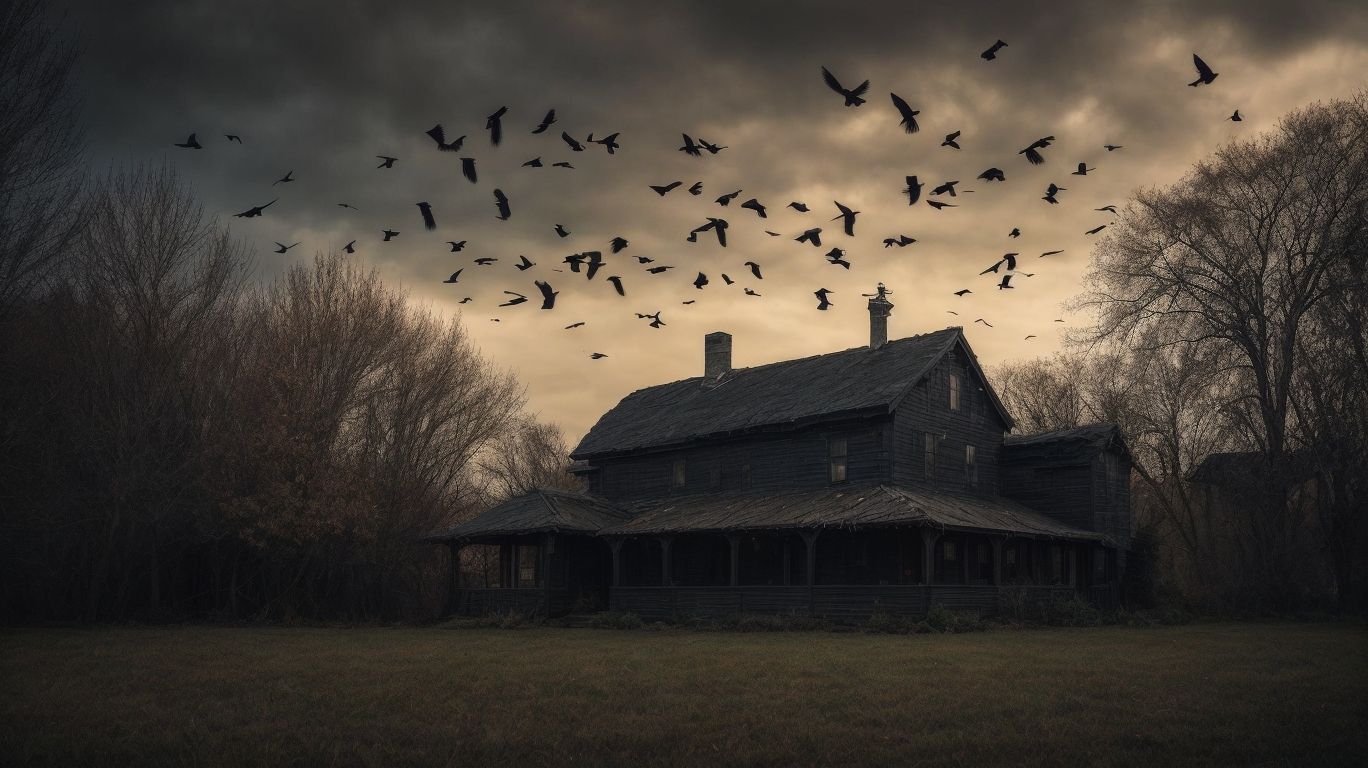
Crows are intelligent and social birds that are commonly found in urban, suburban, and rural areas. If you have noticed a lot of crows around your house, there could be various reasons for their presence. Some may find them fascinating, while others may view them as a nuisance. Here’s everything you need to know about crows and why they gather around your house.
What Attracts Crows to Your House?
There are several reasons why crows may be attracted to your house, including food sources such as garbage, bird feeders, and pet food. Crows are also attracted to shiny objects, so if you have any in your yard, they may be drawn to them.
What Do Crows Symbolize?
In many cultures, crows are seen as symbols of intelligence, wisdom, and good luck. However, they can also be associated with death and bad omens in some beliefs.
How Do Crows Communicate?
Crows have a complex communication system that includes vocalizations, body language, and gestures. They use different sounds to convey different messages, such as warning calls or calls for food.
What Sounds Do Crows Make?
Crows make a variety of sounds, including caws, coos, clicks, and rattles. They can also imitate other birds and animals.
Are Crows Dangerous?
Crows are generally not considered dangerous to humans. However, they can become aggressive if they feel threatened or if their territory is invaded.
Do Crows Attack Humans?
Crows may swoop or dive at humans if they feel their nest or young are in danger. They may also peck or scratch if they feel threatened.
Do Crows Carry Diseases?
Crows can carry diseases such as West Nile virus and avian influenza, but the risk of contracting these diseases from crows is low.
What Should You Do If There Are a Lot of Crows Around Your House?
If you are concerned about a large number of crows gathering around your house, here are some steps you can take:
1. Remove Attractants
Ensure that your yard is clean and free of any potential food sources for crows, such as garbage and pet food.
2. Use Visual Deterrents
Crows are wary of unfamiliar objects, so placing reflective objects or scarecrows in your yard may deter them.
3. Make Noise
Crows may be scared off by loud noises, so using noisemakers or playing loud music may help keep them away.
4. Seek Professional Help
If you are unable to control the crow population on your own, you may want to seek the help of a professional wildlife removal service.
How Can You Prevent Crows From Gathering Around Your House?
Here are some steps you can take to prevent crows from gathering around your house in the future:
1. Keep Your Yard Clean
Regularly clean up any food scraps or debris in your yard that may attract crows.
2. Cover Garbage Cans
Make sure your garbage cans are tightly sealed to prevent crows from accessing them.
3. Install Bird Netting
If crows are targeting your garden or bird feeders, installing bird netting can help keep them away.
4. Use Scare Tactics
You can use scare tactics such as motion-activated sprinklers or fake predators to deter crows from your property.
Why Are There a Lot of Crows Around My House?
Crows may congregate around your house for various reasons such as the availability of food, shelter, or roosting spots. Their cleverness and ability to adjust to different environments make urban areas particularly appealing to them. Moreover, they could be attracted to a nearby food source or shiny objects in your yard.
A friend of mine experienced a similar situation and found that the increase in crows around their house was due to a neighboring tree with ripe fruits, which the crows were happily feeding on every day.
What Attracts Crows to Your House?
Crows are drawn to houses for various reasons, including the availability of food sources, water, and shelter. They are especially attracted to areas where they can easily find garbage, pet food left outside, bird feeders, and water sources like birdbaths. Furthermore, crows are known for their intelligence and may be drawn to human activity, such as regular feeding of other birds.
To discourage crows from gathering around your house, it is important to secure food and water sources and use scare tactics.
What Do Crows Symbolize?
Crows symbolize intelligence, adaptability, and transformation in many cultures. They are often associated with mystery and magic due to their dark color and elusive nature.
In Native American folklore, crows are seen as messengers between the spirit world and the living. In Celtic mythology, they are linked to warfare and the goddess of war, the Morrigan.
Interestingly, crows can recognize human faces and hold grudges against specific individuals. So, what do crows symbolize exactly?
How Do Crows Communicate?
- Caws and vocalizations: Crows communicate through a variety of caws and calls, which can convey different messages related to danger, food, or territory.
- Body language: They use body postures and movements to communicate intentions and emotions to other crows.
- Group behavior: Crows often communicate through group behaviors such as mobbing, where they collectively respond to potential threats or intruders.
What Sounds Do Crows Make?
Crows are known for producing a variety of sounds, such as caws, clicks, coos, and rattles. These vocalizations play a crucial role in their communication within their social groups, serving as a way to signal danger, attract mates, or express agitation.
During my visit to my friend’s farm, I was surrounded by a cacophony of cawing crows. Their calls reverberated through the valley, creating a mystical atmosphere that left a lasting impression.
Are Crows Dangerous?
Crows are not inherently dangerous to humans. However, in certain situations, they may become defensive and protective, especially during their nesting season. It’s essential to respect their space to avoid any potential conflicts.
If you are experiencing a large number of crows around your house, it’s advisable to secure any potential food sources and minimize any disturbances to their habitat to peacefully coexist with them.
Do Crows Attack Humans?
Crows rarely attack humans unprovoked. However, during nesting season, they may become more defensive and swoop down near humans to protect their nests. Instances of crows causing harm to humans are extremely rare and typically occur when crows feel threatened or cornered. So, to answer the question, “Do Crows Attack Humans?”, the answer is yes, but only in rare circumstances and usually as a form of protection.
Do Crows Carry Diseases?
Crows can potentially carry diseases such as West Nile virus, avian flu, and salmonellosis, which can pose health risks. These diseases can be transmitted through contact with crow droppings or respiratory secretions. To minimize the risk, it is advised to avoid direct contact with crows or their droppings, and to keep pets away from areas where crows congregate. Practicing good hygiene and promptly cleaning up any bird droppings can also help reduce the chances of disease transmission.
What Should You Do If There Are a Lot of Crows Around Your House?
If you’ve noticed a large number of crows hanging around your house, you may be wondering what to do about it. These intelligent and social birds can cause a variety of issues, from creating noise and mess to potentially damaging property. In this section, we will discuss various methods for addressing the issue of a large number of crows around your house. From removing attractants to seeking professional help, we’ll explore the different options available to help you deal with this situation.
1. Remove Attractants
- Properly dispose of food waste to eliminate a food source for crows.
- Securely close outdoor trash cans to prevent scavenging by crows.
- Avoid leaving pet food outside, as it can attract crows.
- Minimize open water sources that may entice crows to your property.
To deter crows, address any factors that draw them to your property. By removing attractants, you can decrease the likelihood of crow gatherings around your house.
2. Use Visual Deterrents
- Use reflective objects such as CDs or mirrors to create flashing lights that discourage crows from lingering.
- Hang scarecrow decoys in visible locations to intimidate crows.
- Install bird deterrent balloons or flags to create movement and scare away the crows.
- Utilize predator decoys like fake owls or snakes to instill a sense of danger for the crows.
Pro-tip: Regularly rotate the position of visual deterrents to prevent crows from becoming accustomed to their presence.
3. Make Noise
- Use a loudspeaker or air horn to create sudden, loud sounds to deter the crows.
- Clap hands, bang pots or pans, or use a whistle to disrupt the crows and drive them away.
- Install devices that emit distress calls of crows or other bird species to discourage their presence.
- Play recordings of predator calls to deter the crows from causing damage.
During the Middle Ages in Europe, loud noises were widely used to drive away crows from fields and granaries in order to protect crops and stored grains from their potential harm.
4. Seek Professional Help
- Contact local wildlife authorities for advice and assistance.
- Seek guidance from pest control services familiar with humane bird deterrence methods.
- Consult with ornithologists or bird specialists for insights on crow behavior and management, and consider seeking professional help for effective management.
How Can You Prevent Crows From Gathering Around Your House?
If you have noticed a large number of crows gathering around your house, you may be wondering how to deter them from returning. Fortunately, there are several simple and effective methods to prevent crows from gathering in your yard. In this section, we will discuss four tactics that can help keep these birds at bay. From keeping your yard clean to using scare tactics, we will explore the various ways to discourage crows from making your home their hangout spot.
1. Keep Your Yard Clean
- Regularly remove any fallen fruits, seeds, or nuts from the yard.
- Maintain a well-groomed lawn and keep it free of debris to discourage crows from foraging.
- Dispose of any trash or food scraps properly to prevent attracting crows.
- Secure compost bins or piles to prevent crows from scavenging through them.
2. Cover Garbage Cans
- Use tightly sealed garbage cans to prevent crows from accessing food waste.
- Secure lids with bungee cords or heavy weights to deter crows from opening them.
- Consider investing in animal-proof trash containers designed to keep out pests and animals, including crows.
- Regularly clean the area around the garbage cans to remove any food scraps or spills that may attract crows.
Pro-tip: To further deter crows, sprinkle a few drops of a strong-smelling essential oil, like peppermint or eucalyptus, around the garbage cans as crows dislike strong odors.
3. Install Bird Netting
- Measure the area: Determine the size of the area where crows gather to properly install the necessary bird netting.
- Choose the right netting: Select durable, UV-resistant bird netting with small mesh to effectively deter crows.
- Secure installation: Ensure the netting is tightly secured to prevent crows from accessing the designated area.
- Regular maintenance: Inspect the netting periodically for any damage and promptly make necessary repairs.
4. Use Scare Tactics
- Utilize visual deterrents such as scarecrows or reflective objects to unsettle crows.
- Install motion-activated devices emitting sounds or sudden movements to startle the birds.
- Employ decoys of natural predators like owls or hawks to discourage crow congregations.
- Use bright lights or lasers at night to disrupt roosting patterns and deter crows.
Frequently Asked Questions
What does it mean when I see a lot of black crows around my house?
According to legend, a group of black crows around your house could mean that something significant is about to happen. They may also be scavenging for food, socializing, showing respect or gratitude, or possibly predicting the future.
Are black crows a sign of good luck or bad luck?
The belief that black crows are messengers of bad luck is not supported by scientific evidence. In fact, they can bring happiness, good news, and good fortune. However, some cultures view them as a symbol of misfortune.
Why do crows gather around houses?
Crows are social animals and often congregate near houses for safety, food, socializing, nesting, and reducing noise levels. They may also be searching for potential mates or a safe place to build their nests.
Can crows solve complex problems and share information with each other?
Yes, crows are highly intelligent and have been observed using tools to obtain food. They also communicate with each other through various vocalizations and body language, indicating their ability to solve complex problems and share information.
What are the epic meanings behind black crows gathering around a house?
The six possible meanings are: warning of danger, representing a deceased loved one, bringing good news or fortune, predicting the future, symbolizing a spiritual presence, and serving as a reminder to appreciate life.
Should I be concerned about having a lot of crows around my house?
No, crows are an essential part of ecosystems and play a vital role in controlling pest populations. While they may have a negative connotation in some cultures, it is important to appreciate these intelligent and social birds and their role in nature.



